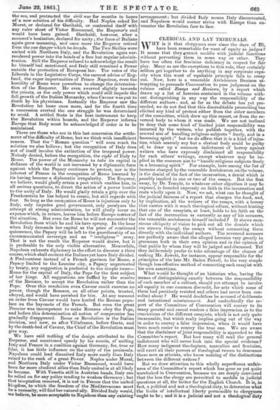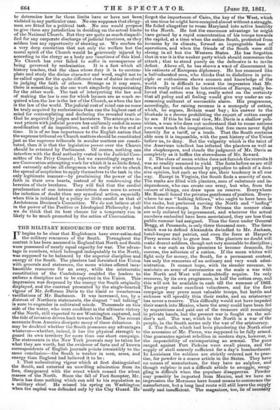CLERICAL AND LAY TRIBUNALS. WHY is it that clergymen ever
since the days of Eli, Y I' have been remarkable for want of equity as judges ? It seems that they,eannot meddle with judicial functions without perverting them in some way or other. They have too often the feminine deficiency in respect for fair play. Many as are the exceptions to this rule, they certainly seldom get together to do anything in any corporate capa- city when this want of equitable principle fails to creep out. Now, here is a venerable Archdeacon Denison at- tempting to persuade Convocation to pass judgment on the volume called _Essays and Reviews, by a report which draws up a list of heresies contained in the volume with- out distinguishing in any way the responsibility of the different authors : and, as far as the debate has yet pro- ,ceeded, we do not find that this discreditable proceeding has elicited any kind of protest either from the other members of the committee, which drew up this report, or from the re- verend body to whom it was made. We are not inclined to deny that some kind of limited joint responsibility was incurred by the writers, who publish together, with the avowed' aim of handling religious subjects " freely, and in a becoming spirit ;" but we do affirm that it is a kind of injus- tice, which scarcely any but a clerical body could be guilty of; to draw up a common indictment of heresy against writers who have expressly disclaimed all responsibility for each others' o except whatever may be im- plied in the common aim to" handle religious subjects freely in a becoming spirit." For example, here among the list of heresies charged by the venerable Archdeacon on the volume, is the denial of the fact of the incarnation, a denial which is possibly implied in one or two of the essays. But the first essay, by Dr. Temple, to whatever other objection it may be exposed, is founded expressly on faith in the incarnation and rests wholly upon it. Now, we ask, what can be thought of the judicial fairness of a report that charges the book, and, by implication, all the writers of the essays, with a heresy that carries with it much theological odium, without hinting that one of the essayists, at least, holds to his faith on the fact of the incarnation as earnestly as any of his accusers, the venerable archdeacon himself included ? It shows mon- strous obliquity of vision to pick out all the denials which are strewn through the essays without connecting, them directly with the individual authors. The reverend accusers are perfectly aware that the alleged heresies vary greatly in gravamen both in their own opinion and in the opinion- of that public by whom they will be judged and discussed. Yet they deliberately prefer to take advantage of the chance of makineb Mr. Jowett, for instance, appear responsible for the principles of the late Mr. Baden Powell, to the very simple though less effective method of connecting each essayist with his own assertions.
What would be thought of an historian who, having the means of distinguishing exactly between the responsibility of each member of a cabinet, should yet attempt to involve all equally in one common discredit, for acts which some of them had positively resisted and others had never been con- sulted about ? He would doubtless be accused of deliberate and intentional misstatement. And undoubtedly the re-' port of the Committee of Convocation will convey to its many general and casual readers a false impression as to the convictions of the different essayists, which is not only quite inexcusable, but which really implies going out of the way in order to convey a false impression, when it would have been much easier to convey the true one. We are aware that the disclaimer of joint responsibility is appended to the Committee's report. But how many will read the general indictment who will never look into the special evidence ? How many indignant theologians, masculine and feminine, will exert all their powers of theological venom to denounce these men as atheists, who know nothing of the distinctions 'between the different writers ?
But we draw attention to this wholly superfluous unfair- ness of the Committee's report which has gone as yet quite unrebuked in Convocation, because we are deeply convinced that the less the clergy are permitted to meddle in judicial questions at all, the better for the English Church. It is, in fact, a political and not a theological duty, to determine what the limits of intellectual liberty permissible to clergymen `ought to be.; and it is a judicial and not a theological duty to determine how far these limits have or have not been violated in any particular case. No one supposes that clergy- men are fitted for a political task. No one would propose to give them any jurisdiction in deciding on the actual limits of the National Church. But they are quite as much disquali- fied for any corporate discharge of judicial functions, as they seldom lose any opportunity of showing us. We confess to a very deep conviction that not only the welfare but the moral spirit of the Church would be grievously injured by according to the clergy as a body any functions of this kind. No Church has ever failed to suffer in consequence of being governed by ecclesiastics. It is a fact which all history teaches, that the class whose duty it is to contem- plate and study the divine character and word, ought not to be called upon for the quite different class of duties involved in judging the faith of others. Strange as it may seem, there is something in the one work singularly incapacitating for the other work. The task of interpreting the law and of making the law is one for which laymen are as much re- quired when the law is the law of the Church, as when the law is the law of the world. The judicial cast of mind can no more be truly acquired by ecclesiastics than can the highest cast of mind for contemplating and declaring the revealed truth of God be acquired by judges and barristers. The attempt to in- vest priests with judicial powers has uniformly ended in some modification of an inquisition, and will do so to the end of time. It is of no less importance to the English nation that the supreme tribunal on Church matters should be constituted just as the supreme tribunals in secular matters are consti- tuted, than it is that the legislative power over the Church should be retained by Parliament. Of course, nothing can interfere with the final authority vested in the Judicial Com- mittee of the Privy Council ; but we exceedingly regret to see Convocation attempting work for which it is so little fitted, and earnestly-advise all clergymen who really wish to check the spread of scepticism to apply themselves to the task in the only legitimate manner—by proclaiming the power of the faith in their own hearts, instead of by condemning the heresies of their brethren. They will find that the cordial proclamation of one intense conviction does more to arrest the infection of doubt than any synodical action, especially when this is initiated by a policy so little candid as that of Archdeacon Denison's Committee. We do not believe at all in the power of the Positive or Ideological Philosophy ; but we do think that its best chance for a temporary run is likely to be much promoted by the action of Convocation.































 Previous page
Previous page